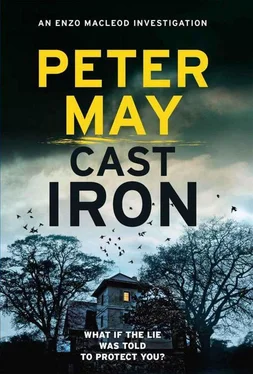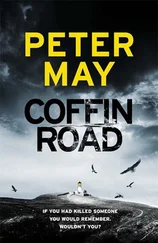One by one, he sifted through their contents. Police reports and official correspondence. Newspaper clippings, private letters. But most poignant of all were the photographs. And Enzo found himself looking at the faces of six young women, all of them long dead, he was sure. There were several photographs of each. Family snaps of smiling teenagers in happier days. Strips from photo booths. Faces serious and sad and sometimes silly. A portrait. This was the girl who had claimed to be an actress, and maybe that had been her ambition. But how often was it that unfulfilled dreams led to failed lives, a slide into despondency or despair, or sometimes simply an acceptance of a life less special than childhood hope had dared to imagine? This was a girl with fine, high cheekbones, lips lush with the promise of soft kisses, dark eyes reflecting light, hope and innocence in equal measure. Inestimably sad. Enzo slipped it back into its folder with a deep sense of depression.
The murdered girl from Poitiers had been photographed in death — eyes open, skin touched by blue. A face ravaged by drugs and aged by an endless procession of men in her bed, using her for sex without any sense of the human being she was. Her clients had cared about nothing but sexual gratification. One of them might even have given her the virus that would eventually have killed her, even if the man with the knife had not.
Enzo found himself thinking about his own girls, Sophie and Kirsty, and how he would feel if anything were to happen to them — thoughts he could not even contemplate without pain. And his heart went out to all those poor people who had sat around the Martins’ dinner table tonight, almost overwhelming him with a sense of obligation that he knew he could never fulfil.
He looked down and saw that he was holding yet another photograph in his hands. It showed a young woman with short blond hair, dyed and streaked through with a darker brown. This was the daughter of the Linols — Sally — the one they claimed had known the murdered prostitutes. She had an impish smile and glittering green eyes. A photograph taken somewhere on a sunny summer’s day. The cut of her white T-shirt revealed the brown curve of her neck, and exposed the tattoo of a feather that ran from her collar bone to the lobe of her ear. The tattoo had been professionally done in fine blue lines that created an illusion of softness, and Enzo might almost have thought it beautiful, if he had not considered all tattoos to be acts of self-mutilation.
He was glad he had fought Sophie’s teenage wilfulness, and forbidden tattoos on pain of death. She had got her revenge by taking up with a boy who had them everywhere on his body. Before falling for Bertrand, a young bodybuilder whose facial studs and piercings would have set off security alarms at any airport in the world. Fortunately, Bertrand had grown out of his ‘metal’ phase and proven himself to be much more than met the eye. And Enzo was relieved that Sophie had stuck with him in the end.
He looked again at Sally and her feather, and wondered what had really become of her. Had Blanc killed her like the others? If so, why had she never been found, and why would Blanc have bothered to clear out her apartment?
Pointless questions to which he knew he would never find the answers.
Finally he lifted the photograph of Lucie. A professional head-and-shoulders taken on her nineteenth birthday. Her father had spoken of her innocence, and it was apparent in her wide, blue eyes and open, smiling face. Not a beautiful face, but pretty. Golden curls softening angular lines. A face that would have aged well, like her mother’s. Enzo laid it down on the bed again, and found himself sick of it all. Of death and crime scenes, of blood spatter and DNA. An endless parade of dead faces and horrific injuries. He’d had enough. When he had resolved the final case in Raffin’s book, he was going to give it all up. Maybe he could take early retirement. Travel a little. Read. And then he recalled that the final murder in the book was that of Raffin’s wife. The unresolved murder that had motivated Raffin to write the book in the first place. And it would not be without its own peculiar and very personal pain.
He sighed, slipping Lucie back into her folder so that he no longer had to gaze on that pretty, dead face in the knowledge that finding her killer was the reason for his being here.
Instead, he lifted the original of Blanc’s letter that Martin had given him. This, he knew, was the one great enigma in this whole case. Martin claimed that it proved beyond doubt the link between Blanc and his daughter. And, of course, it did. But it did not, to Enzo’s reading, suggest that there was anything in Blanc’s mind other than the expression of his love. And if that, indeed, was how he felt about Lucie, why would he have killed her?
It was written on a page torn from a spiral notebook and dog-eared from constant handling. There was the hint of a cigarette burn in one corner, and what might have been a coffee stain. The handwriting was spidery and childish.
My dearest Lucie,
I know I don’t deserve to even share the same space with you. I am a man who has known and did terrible things. I know you know it’s not my fault, but people hate me for the things I’ve done. And you don’t. You make me feel like I am someone else. No... like I could BE someone else. The man you would WANT me to be. I can only try and earn your love in return. Please forgive me. I really hope you will.
Love R
It was a curious mix, Enzo thought, of the lyrical and the illiterate. Here was a hardened criminal, a man who ran prostitutes and had just served a prison term for violent assault, prostrating himself in front of a girl not much more than half his age. It seemed so entirely out of character. And the intimacy of the sign-off — Love R — as if they might have known each other for half a lifetime. It was troubling.
Enzo gathered everything together and dropped it on to the floor before turning out the light and curling up beneath his duvet in the certain knowledge that these girls would haunt the days and maybe weeks ahead, and that, tonight, sleep would not come easy.
Retired commissaire Michel Bétaille lived in a modest two-bed apartment in a modern block in Bordeaux Bastide, near the botanical gardens just off the Quai des Queyries. From a front room with sliding glass doors on to a narrow balcony, he had a view across the slow-moving pewtery waters of the River Garonne to the Quai Louis XVIII, where négociants had built grand offices along quays from which barrels of Bordeaux wine were once loaded on to the boats that took it all around the world.
Bétaille was younger than Enzo had been expecting. A man in his mid-sixties, and yet he had retired more than twenty years ago. He smiled when Enzo asked him about it. ‘Retired from the police,’ he said. ‘Not from life, or work. As a commissaire I saw too much of the worst of folk. Bad bastards, death and blood. Ruined and wasted lives. Lies and deception. You either get inured to it, or it breaks down your humanity and marks you for life. I was somewhere between the two, and knew that I had to get out before it destroyed me.’
He waved Enzo into a seat by the window.
‘Can I get you a coffee?’
‘Thank you.’
The kitchen, dining and living areas were open-plan. Comfortable living for one. A squeeze for two. Bétaille disappeared behind his kitchen island and primed an espresso maker.
‘You live here on your own?’ Enzo asked above the noise of beans being ground.
Bétaille smiled. ‘Yes. Saw too many marriages fail among my fellow officers, so I was never tempted. Police and families don’t mix. Besides which, I probably just never met the right woman.’ He chuckled. ‘And then you get to a certain age and, you know how it is. You don’t want someone else filling your private space, moving your things around, interfering with your routine.’ Pause. ‘How about you?’
Читать дальше












